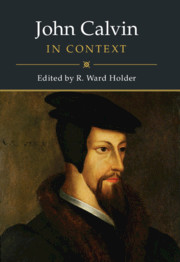Book contents
- John Calvin in Context
- John Calvin in Context
- Copyright page
- Dedication
- Contents
- Contributors
- Acknowledgments
- Abbreviations
- Introduction
- Part I France and Its Influence
- Part II Switzerland, Southern Germany, and Geneva
- Part III Empire and Society
- Part IV The Religious Question
- 19 Western Ideals of Religious Reform
- 20 The Luther Affair
- 21 Religious Colloquies
- 22 The Council of Trent and the Augsburg Interim
- 23 Biblical Scholarship
- 24 The Printed Word
- 25 Polemic’s Purpose
- 26 The Style of Theology
- 27 Baptism
- 28 The Eucharist
- 29 Predestination in Early Modern Thought
- 30 The Challenge of Heresy
- 31 Early Modern Christianity and Idolatry
- 32 Trinitarian Controversies
- 33 Nicodemism and Libertinism
- Part V Calvin’s Influences
- Part VI Calvin’s Reception
- Conclusion
- Bibliography
- Index
- References
30 - The Challenge of Heresy
Servetus, Stancaro, and Castellio
from Part IV - The Religious Question
Published online by Cambridge University Press: 14 November 2019
- John Calvin in Context
- John Calvin in Context
- Copyright page
- Dedication
- Contents
- Contributors
- Acknowledgments
- Abbreviations
- Introduction
- Part I France and Its Influence
- Part II Switzerland, Southern Germany, and Geneva
- Part III Empire and Society
- Part IV The Religious Question
- 19 Western Ideals of Religious Reform
- 20 The Luther Affair
- 21 Religious Colloquies
- 22 The Council of Trent and the Augsburg Interim
- 23 Biblical Scholarship
- 24 The Printed Word
- 25 Polemic’s Purpose
- 26 The Style of Theology
- 27 Baptism
- 28 The Eucharist
- 29 Predestination in Early Modern Thought
- 30 The Challenge of Heresy
- 31 Early Modern Christianity and Idolatry
- 32 Trinitarian Controversies
- 33 Nicodemism and Libertinism
- Part V Calvin’s Influences
- Part VI Calvin’s Reception
- Conclusion
- Bibliography
- Index
- References
Summary
The challenge of heresy is inherent to any claim of orthodoxy by the Christian Church. The New Testament already states that there must be heresies so that those who are genuine believers may be recognized.1 As deviation from the ecclesial norm of orthodoxy, heresy threatens the unity of the Church, and even the integrity of society at large, when Christianity is the official religion of the empire as it was from AD 380. Heresy was a revolution, an attack on the order of the world. While modern readers may be tempted to view heresy as some positive expression of individual creativity in matters of doctrine, perhaps an instance of freedom of speech, such ideas were alien to the early modern mind. The stereotype of the heretic was not a creative individual, but someone possessed by the devil, driven by pride, who hid his heresy under the cover of seeming piety. Of course, not all doctrinal errors, dissident beliefs, and practices, were heresies. Error became heresy by obstinate refusal to obey the Church, which had defined orthodox teaching and sought to correct errors. As Robert Grosseteste defined: “a heresy is an opinion chosen by human perception contrary to holy Scripture, publicly avowed and obstinately defended.”2
- Type
- Chapter
- Information
- John Calvin in Context , pp. 258 - 266Publisher: Cambridge University PressPrint publication year: 2019

